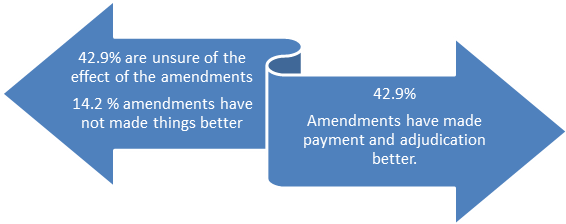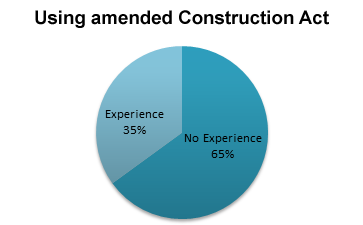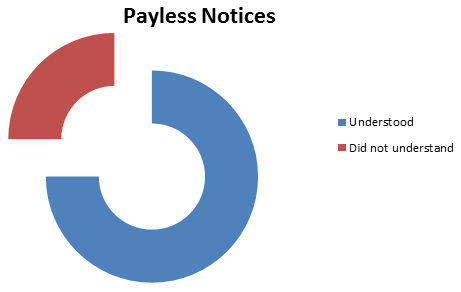This being the first of that three year period, we wanted to know how the 'New' Act was being applied to projects. Our short survey was launched on 22 October 2012 and lasted for 4 weeks.
Respondents
We had 20 responses covering the main category of stakeholders in the construction process. This included Clients, Contractors, Consultants and Adjudicators. The respondents represented a range of ages, company types and were drawn from both public and private sectors.
Experience working under the amendments to the Act
The start point of our survey was to enquire how many of our respondents had worked on projects or been involved in the resolution of disputes covered by contracts under the new Act. This would be new projects that commenced in England and Wales after 1st October 2011 and new projects in Scotland after 1st November 2011. Because of the current state of the economy we were not expecting the majority of our respondents to have experience working with the new Act.
This expectation was borne out by the survey result, 65% of respondents had no experience working under the new Act, however an encouraging 35% had commenced projects since the amendments came into force.
Payments
Under payments we were interested in finding out how the cocktail of changes introduced by the amendments were being managed i.e. new notices, tighter timeline for issuance of certificates among others.
Amendment of payment timeline
Maintaining a regular cashflow through the construction supply chain has been the major driver of the Act and the recent amendments. We asked whether the final date for interim payment set out in most standard form contracts was being maintained or if parties were amending the timeline. On the average the popular standard form contracts set 14-17 days after the payment due date as the final date for payment.
Half of the respondent that answered this question indicated that the timeline was being amended while the remaining half indicated that the timeline were maintained.
The average period of amendment was 35 days from the due date.
Effect of new time period for issuance of Interim Certificates
The new Act, requires that an interim certificate/payment notice be issued within 5 days of the payment due date stated in the contract. A failure to adhere to this timeline gives the payee (contractor or sub-contractor) the right to issue a default payment notice or activates an earlier application for payment to a default payment notice. We asked clients and consultants to respond in free text how they felt about the new timeline. A sample of responses we received included:
'No noticeable effect'
'More added pressure'
'The effect of the new time period has been positive and instils clarity'
Confidence Issuing Default Payment Notices
The other side of the coin for interim certificates/ payment notice is default payment notices. The main thrust of the amendments to the payment provisions is to give the party receiving payment more control over the payment process. Thus the payee (contractor and sub-contractors) can now set the payment process rolling where there has been a default by the payer to issue an interim certificate/payment notice. We asked Contractors and Sub-Contractors who responded to our survey and indicated they had experience working under the new Act how well they understood the process of issuing default payment notices and how it worked.
50% indicated that they were confident issuing a default payment notice and indicated it kicked in if there was a failure to issue an interim certificate/ payment notice by the client.
50% expressed a lack of confidence and knowledge on the timing and process for issuing default payment notices.
Payless Notices
The final part of the periodic payment juggernaut is the payless notice, which is to be issued by the client or specified person (who is usually the consultant), when the client intends to pay a lesser amount than that notified in the payment notices.
We asked clients and consultants who had indicated experience working under the new amendments how well the understood the process for the issuance of a payless notice:
75% responded that they understood the process quite well while 25% were not too confident about how it works.
Respondents, who answered that they understood the process, were then asked in free text to explain how they felt about the process. A sample of the answers we received included:
'Like a withholding notice but covers all reductions from interim certificates, payment notices and so on. This issue is timing'
'Clearer than the previous Act'
Adjudication
While we had thought it would be relatively early for disputes on the new Act, we wanted to know from adjudicators what they thought of the changes in the new Act to adjudication.
Rule to correct typographical and clerical errors
This was already established as a common law rule in England and Wales but was codified in the new Act and made applicable to all of the UK. All our respondents who answered this question saw this as a positive development.
Admission of Oral Contracts
While the admission of oral and partly written contracts was one of the major planks of the new amendments, adjudicators that responded to our survey did not indicate any specific new rules/plans to deal with disputes arising from such contracts.
Have the amendments made adjudication and payment better?
Finally we sought to know from all our respondents whether they thought the amendments had made things better for payment and adjudication processes in construction projects.

In free text we asked respondents to justify their responses. A sample of answers we received were as follows:
'It realizes any potential disputes earlier'
'It has improved cashflow'
'Easier for a consultant to take action if the Employer fails to submit a payment notice in time'
'it confuses things'



